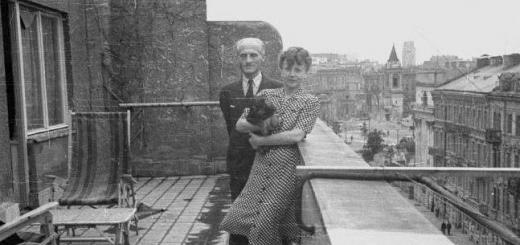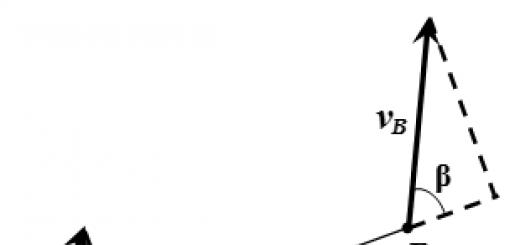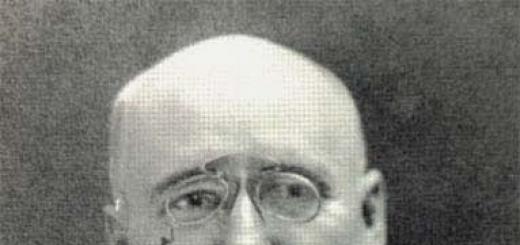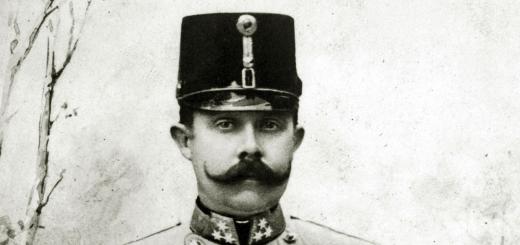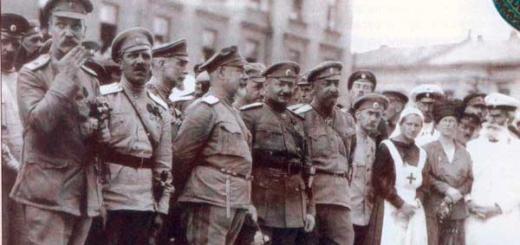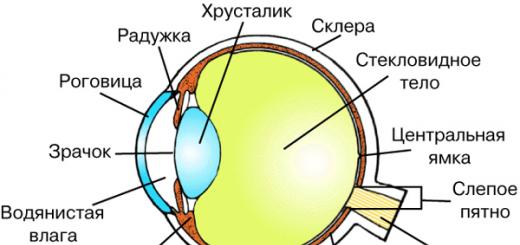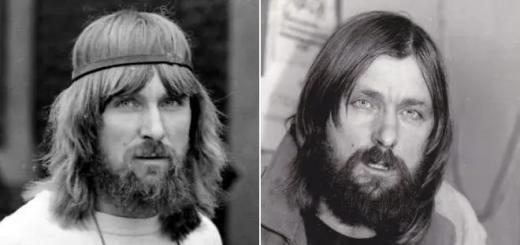(real name Bestuzhev, Marlinsky - pseudonym) - writer, b. October 23, 1797 d. July 7, 1837. His childhood, according to his brother, M. A. Bestuzhev, passed in the most favorable conditions. His father was an educated man, with a soul devoted to science and enlightenment. “Our house,” says M. A. Bestuzhev in his memoirs, “was a rich museum in miniature... Being surrounded every day by such a variety of objects that aroused children’s curiosity, using access to his father at all times..., listening to his talk and discussions with scientists, artists and craftsmen, we involuntarily... absorbed with all the pores of our body the beneficial elements of the elements surrounding us... "The diligent Sasha" (i.e. Alexander Alexandrovich), read so much, with such greed that my father often was forced to temporarily take away the keys to his cabinets... Then he smuggled books for himself - some novels or fairy tales." At the age of 10, A.A. entered the mountain corps. According to his brother, A.A. was an extremely impressionable, exalted person. In the corps he was always the first or one of the first, although he did not like mathematics and the German language. His literary inclinations were evident even in his student days. While in the building, he kept a diary. “It is not clear,” says his brother, “how, given the monotonous situation of the building, he daily found so much strength in his childish head to fill entire pages of the diary, without repeating himself in the descriptions of the incidents of everyday life or in the depiction of a long gallery of portraits, changing the cheerful tone more serious and even sometimes falling into sentimentality." Particularly good was the part of the diary in which Bestuzhev drew caricatured portraits of his comrades, teachers, officers and even ministers. “The Enchanted Forest” was the second work of the young Bestuzhev. It was a play in 5 acts, composed for a home puppet theater. In these two early works of the future Marlinsky, according to his brother, his shortcomings and advantages as a writer were reflected. “The lack of a flowery style,” says M.A., was innate in him.” In general, Bestuzhev was a talented boy, but he was interested in one thing or another. After his first literary experiments, he began to get involved in theater. “Exercises under the guidance of artists,” says his brother, “developed his decorating talent so much that when a theater was subsequently formed in the mountain building, Alexander was the main decorator and costume designer. My brother always took on the most spectacular roles.” His passion for theater was followed by a passion for naval service, which Bestuzhev became acquainted with after living for some time on a ship with his older brother, Nikolai, then a midshipman. Bestuzhev begged his mother’s consent to leave the mountain corps and began to actively prepare for the midshipman exam. Soon, however, he abandoned this intention, due to the difficulty of higher mathematics, and began to study artillery and fortification; in the end, he entered the Life Guards as a cadet. dragoon regiment, at the suggestion of General Chicherin. A year later, in 1818, he was promoted to officer. The dragoon regiment was then stationed in Peterhof, and Bestuzhev lived in Marly, which is why his first critical article (in 1821, “Letter to the publishers” of “Son of the Fatherland”) appeared under the pseudonym of Marlinsky (Marly is a small two-story stone palace in Peterhof, at the entrance to lower garden; it was built under Peter II and named “Marly” after the example of the same palace located in the vicinity of Paris). Bestuzhev's first printed work, published in "Son of the Fatherland" in 1819, part 52, pp. 180-181, was "Excerpt from the Comedy Optimist." It was followed by a number of translations and original articles on history, industry, and literary history; they were placed mainly in the “Competitor of Enlightenment and Charity.” On November 15, 1820, Bestuzhev, then already a lieutenant of the dragoon regiment and adjutant to the head of the department of communications Betancourt, was elected a member of the Society of Lovers of Russian Literature. Bestuzhev's first work to attract the attention of the public and critics was his "Trip to Revel." At first this journey was published in “Competitor”, and then came out as a separate publication. He was followed by a number of critical articles in the same magazine and in Son of the Fatherland. In 1821, Bestuzhev was elected censor of the Society's bibliography for the journal "Competitor" and remained in this rank until his exile, that is, for 4 years. In the first half of 1822, Bestuzhev, together with K. F. Ryleev, decided to publish an almanac - a type of publication that has not appeared in our country since the times of Karamzin’s “Aonids”. In 1823, “The Polar Star” was actually published, greeted with unanimous praise from magazines and having enormous success among the public, which is explained by the collaboration in it of the best forces of our literature of that time - A. S. Pushkin, Krylov, Zhukovsky, Delvig, Baratynsky, and etc. In the “Polar Star” of 1823, Bestuzhev’s article is especially remarkable: “A look at old and new literature in Russia,” which sparked controversy. His stories “Roman and Olga” and “Evening at the Bivouac” were also successful among the public. The Polar Star continued to be published in 1824 and 1825, enjoying the same resounding success as before. In this almanac, remarkable for its time, Bestuzhev published for 1824 and 1825. “Views on Russian literature during 1823 and 1824,” a number of small reviews named in the article about Bestuzhev by Mr. Semevsky, several works of fiction, such as “Castle Neuhausen”, “Novel in Seven Letters”, “Revel Tournament” and etc. The latest works were less successful than his literature reviews, which were of interest to everyone. Despite its short duration, Bestuzhev’s critical activity left a noticeable mark on the history of Russian literature: Marlinsky is our first representative of romantic criticism, the main figure of which was later Polevoy. By 1826, the fourth volume of the almanac was being prepared, under the modified title “Asterisk,” but December 14 stopped it. However, several printed sheets and all the handwritten text survived, and this material was published by P. A. Efremov in "Russian Antiquity", 1883, vol. XXXIX. In 1825, Bestuzhev was the adjutant of the Duke of Wirtemberg and belonged to a secret society. On December 14, he led a battalion of the Moscow regiment to Senate Square and was one of the main characters here. When the rebels were scattered, Bestuzhev managed to hide, but the next day he himself appeared at the guardhouse of the Winter Palace and confessed. Since the degree of his complicity was not as significant as that of his two brothers, Nikolai and Mikhail, who were classified by the Supreme Criminal Court as category 2, and by the Highest Decree compared in punishment with criminals of category 1, he was exiled to Yakutsk. From the end of 1825, for three years, Bestuzhev’s works did not appear in print. But even in Siberia, he did not abandon literary pursuits: with the meager choice of benefits received from St. Petersburg, he studied foreign languages in Yakutsk, and also studied the region and the customs of the inhabitants; this gave content to several of his ethnographic articles about Siberia, which were included in his collected works (1832, parts 1 and 4). He met in Yakutsk and became friends with the learned traveler Doctor Erman. Bestuzhev also wrote poems in Siberia that were published only after his death (vol. XII, published in 1839 and 1843). The first work that appeared in print after 1825 was the first chapter of the story in verse “Andrei, Prince of Pereyaslavsky” (Moscow, 1828). In the fall of 1829, as a special favor, Bestuzhev was transferred to the Caucasus as a private in the Black Sea battalion No. 10, with length of service. While stationed in garrison in Derbent, he began to write fiction and the first story he wrote here was “The Test” (published in “Son of the Fatherland” in 1830. , without author's name). Subsequent works were published in the same magazine, as well as in the Moscow Telegraph and Library for Reading. Of these, the following were especially famous: “Terrible Fortune-telling” (1831), “Ammalat-Bek” (1832), “Frigate Nadezhda” (1833) and “Mulla-Nur”. Marlinsky had a huge circle of readers, although criticism, in the person of Belinsky, did not share the passion of the public, who especially liked his pictures of Caucasian nature and morals, described although pompously and elegantly, but smartly and captivatingly. Belinsky, recognizing Marlinsky’s outstanding talent, said that he belongs “to the number of remarkable and important negative figures in the literary development.” Marlinsky was one of the brightest representatives of the romantic trend in Russian literature, which dominated for about 20 years and gave way only to the realistic influence of Pushkin and Gogol. - In the Caucasus, Bestuzhev perfectly studied the Tatar language and several mountain dialects. In skirmishes with the mountaineers, he showed miracles of courage, as in affairs at Bayburg, on the Chircheya Bridge, under the walls of Derbent. For this, he was promoted to ensign and presented with the St. George Cross, but did not receive it, as he was put on trial on charges of murdering his beloved Olga Nestertsova in his apartment (in 1832), under very mysterious circumstances. It was believed that the murder was committed by Marlinsky out of jealousy; however, the investigation, biased more against Bestuzhev than in his favor, clearly proved that Nestertsova’s death was simply an accident. The last four years of his life he lost interest in everything and almost stopped working on literature. During the capture of Cape Adler (Konstantikovsky), Bestuzhev was in the detachment of General V.D. Valkhovsky. The latter repeatedly kept him out of danger, asking him to stand in the cordon. But Bestuzhev, with his characteristic desperate courage, went too far forward, was killed and chopped into pieces by the mountaineers. - The first collected works of Bestuzhev were published in 8 volumes in 1832-1834; The 2nd edition also appeared in 8 volumes in 1835-1839; 3rd (Glazunova), at 9 o'clock, in 1838-1839. The Complete Works, Parts IX - XII (continuation of the 2nd edition), appeared in 1838-1839. The second complete collection (and generally the 4th edition), at 12 noon, was published in St. Petersburg, in 1843. Translations of Marlinsky’s best works were made into the following languages: French, German, English, Danish, Swedish, Czech, Georgian and Polish. Detailed instructions on translations are given in Gennadi. Recently, Marlinsky’s best works have appeared in eight volumes of A.’s “Cheap Library.” S. Suvorin.
M.I. Semevsky, biographical article about Marlinsky and the latter’s letters, in Otech. Zapiski, vol. 130, 1860, no. 5-7. - “Marlinsky’s childhood and youth”, memoirs of M. A. Bestuzhev in “Russian Word” 1860 No. 12. - “Encyclopedic Dictionary” Berezin, vol. III, pp. 581-582. - “Where did Marlinsky go?” V. Savinova, “Family Circle” 1858, No. 1. - Acquaintance with Griboedov, “Otech. Notes”, vol. 132, 1860, No. 10. - “A few words about the death of Bestuzhev”, K. Davydov in “Moscow Vedas” " 1861, No. 24. - His letters to the Polev brothers (1831-1837), in "Russian Bulletin" 1861, vol. 32. - Biogr. information in "Russian Antiquity" 1870, vol. I. - "Illustrated newspaper" 1870, No. 15. - "From the notes of N. I. Grech" in "Russian Vest." 1868, No. 8. - Regarding the murder of Olga Nestertsova, see "New Time" 1888, Nos. 4749, 4752 and 4756. - In No. 93 "Khark. Gub. Ved." dated April 10, 1891, a letter from Bestuzhev appeared to General V.D. Valkhovsky with a request for transfer to the cavalry. The letter is placed in a feuilleton under the title “From the family archive of Kamenka.” - Of the critical articles about Marlinsky, Belinsky’s article is especially important, vol. III, 438-487. - Dictionaries: Gennadi, Andreevsky, Vengerov.
S. Trubachev.
(Polovtsov)
Bestuzhev-Marlinsky, Alexander Alexandrovich
(Bestuzhev, better known under the pseudonym Marlinsky, born October 23, 1797, killed in the Caucasus on July 7, 1837) - fiction writer and critic; son of Alexander Fedoseevich B. (1761-1810), who together with I.P. Pnin published the “St. Petersburg Journal” in 1798 and compiled “The Experience of Military Education of Concerning Noble Youth.” He was brought up in the Mountain Corps, then was an aide-de-camp to the commanders-in-chief of the communications routes, General Betancourt and the Duke of Württemberg, and finally, with the rank of staff captain, transferred to the Life Guards. dragoon regiment For participation in the Decembrist conspiracy of 1825 he was exiled to Yakutsk, and from there in 1829 he was transferred to the Caucasus as a soldier. Participating in many battles here, he received the rank of non-commissioned officer and the St. George Cross, and then was promoted to ensign. Killed in a skirmish with highlanders in the forest on Cape Adler; his body was not found. B. entered the literary field in 1819 with poems and short stories published in “Son of the Fatherland” and “Competitor of Enlightenment,” and in 1820 he was elected a member of the St. Petersburg Society of Lovers of Russian Literature. In 1821, his “Trip to Revel” was published as a separate book, and in 1823-25. he, together with K. F. Ryleev, published the almanac "Polar Star". This almanac - a very remarkable literary phenomenon in its time - was met with general sympathy; Around the young, talented and beloved editors, almost all the leading representatives of our then literature united, including Pushkin, who from Odessa and then from his Pskov village maintained a lively correspondence with B. on literary issues and sent him his poems. In "The Polar Star" B. acted not only as a novelist ("Castle Neuhausen", "Novel in Seven Letters", "Revel Tournament", "Traitor"), but also as a critic: his reviews of old and modern fine literature and journalism drew attracted general attention and caused lively debate. This was the time when in our literature, thanks especially to the works of Pushkin, the question of the form and content of artistic creativity was raised head on - the question of the so-called. "classicism" and "romanticism". All young and fresh literary forces, following Pushkin, came under the banner of a new direction, which was dubbed “romanticism” and which, in essence, was a practical preaching of freedom of artistic inspiration, independence from recognized literary authorities both in the choice of content for poetic works and in methods of its processing. B. also appeared as an ardent and zealous defender of this trend. He sharply and at the same time wittily attacked the defenders of the old pseudo-classicism, proving that the century of this trend, like the era of powdered wigs that created it, had passed forever and that the literary Old Believers, continuing to clutter literature with this carrion , only harm and interfere with the free development of talents. The negation of classical rules and techniques as unnecessary old rubbish, and the demand for complete, unfettered freedom for poetic creativity - these were the main provisions of B.'s criticism. He considered Shakespeare, Schiller, and especially Byron and (later) Victor as ideal types of poet-artists Hugo. Not distinguished by the depth of their views, B.'s critical articles, however, produced a strong impression with their ardor, liveliness and originality; they always provoked a more or less lively exchange of opinions, were read and discussed by everyone, and thus awakened critical thought in our literature at a time when our literary criticism was still, one might say, in its infancy. Belinsky recognized these articles by B. as “an integral and important contribution to Russian literature and the literary education of Russian society,” adding to this that B. “was the first to say a lot of new things in our literature,” so criticism of the second half of the 20s was in many respects only a repetition of the literary reviews of "The North Star".
The December events of 1825 temporarily interrupted B.’s literary activity. Already printed sheets of the “Polar Star” for 1826 with his article were destroyed; he himself was first taken to the Shlisselburg fortress, and then exiled to Yakutsk. Here he zealously studied foreign languages, and also became acquainted with the region, morals and customs of the local residents; this gave content to several of his ethnographic articles about Siberia. Here he began a story in verse entitled “Andrey, Prince of Pereyaslavsky,” the first chapter of which, without the name or consent of the author, was published in St. Petersburg, 1828. The next year, B. was transferred to the Caucasus, as a private, with the right of seniority. At first, after his arrival, he constantly participated in various military expeditions and skirmishes with the mountaineers, and only got the opportunity to return to literature in 1830. From this year, first without a name, and then under the pseudonym of Marlinsky, his appearance appeared in magazines more and more often stories and stories (“Test”, “Incursions”, “Lieutenant Belozor”, “Terrible Fortune-telling”, “Ammalat-bek”, “Frigate Nadezhda”, etc.), published later, in 1832, in 5 volumes (under the title: "Russian tales and stories" and without author's name). Soon a second edition of these stories was needed (1835 with the name of A. Marlinsky); then new volumes were published annually; in 1839 the third edition appeared, in 12 parts; in 1847 - fourth. M.'s most important stories were reprinted in the 1880s. in the “Cheap Library” by A. S. Suvorin.
With these works of his, Bestuzhev-Marlinsky in a short time gained enormous fame and popularity among the Russian reading public. Every new story of his was eagerly awaited, quickly passed from hand to hand, and read to the last page; the magazine's book with his works was made public property, so his story was the most reliable bait for magazine subscribers and almanac buyers. His works were sold in great demand and, what is much more important, they were not only read by everyone, they were memorized. In the 30s, Marlinsky was called the “Pushkin of prose,” a genius of the first category, who had no rivals in literature... The reason for this extraordinary success was that Marlinsky was the first Russian novelist who took on the task of depicting the life of Russian society, deduced in his stories of ordinary Russian people, gave descriptions of Russian nature and at the same time, distinguished by great ingenuity for various kinds of effects, he expressed himself in a special, extremely flowery language, full of the most exquisite comparisons and rhetorical embellishments. All these properties of his works were completely new in our literature of that time and made an even stronger impression since the Russian public, indeed, had not yet read anything better (the stories of Pushkin and Gogol appeared later).
In his novels and stories, Marlinsky was a real “romantic.” In them we see a style and techniques very closely reminiscent of the German Sturm und Drang of the 70s of the last century and the “frantic” French fiction of the school of V. Hugo (with whom Marlinsky was most fond of). Both there and here - the desire to draw ideal natures in good and evil, deep feelings, strong and ardent passions, for which there is no other expression except the most pathetic; both there and here - a play with comparisons and contrasts of the sublime and the vulgar, the noble and the trivial; in the name of contempt for classical theories and rules - an intense pursuit of a beautiful, original phrase, of effect, of wit - in a word, of what in the German language of the era of Schiller and Goethe was called "genius", and in the language of Marlinsky's fans and critics received an ironic the name "Bestuzhev drops". And along with this - a complete disregard for the real worldly truth and its requirements (which at that time none of the writers even dreamed of) and complete artificiality, concoction of both the plan and its implementation. Marlinsky was the first to release into our literature a whole crowd of aristocratically graceful “higher natures” - princes Lidins, Gremins, Zvezdins and the like, who live only in the heavenly bliss of love or the hellish torments of jealousy and hatred - people whose “brows” are marked with a special strong seal passions. They express their emotional storm in brilliant, pompous rhetorical language, in a theatrically refined pose; in them “everything that poets love to chat about, that women so frivolously play with, that lovers try so hard to pretend to be, boils like melted copper, over which the very couples, not finding a source, are ignited with flame... Ardent, powerful passion rolls like lava; it carries away and burns everything it comes across; collapsing itself, it destroys obstacles into ashes, and even for a moment, it turns even the cold sea into a seething cauldron...” “Nature,” says one of these heroes of Marlinsky, “ punished me with frantic passions, which neither education nor skill could curb; fiery blood flowed in my veins."
And neither one, nor the other, nor the tenth of these spectacular heroes actually has a drop of real blood, no real, real life, character, type. All of them are pale and ethereal ghosts, created by the imagination of a romantic fiction writer and only on the outside covered with bright sparkles of pretentious style. Belinsky rightly identified Marlinsky as a talent external, thus indicating the main reason for his rapid rise and even faster fall in literature. In fact, he was read and admired only until a fresh current appeared in literature in the stories of first Pushkin, then Gogol, which set completely different demands for the writer, practically indicating the need to bring literature from its abstract heights to the soil of real life. As soon as this need was felt, as soon as the reader declared his desire to see himself and his life in the book without rhetorical embellishment, he could no longer continue to admire Marlinsky’s “genius,” and the writer they loved was soon abandoned and forgotten. The best of Marlinsky's stories are considered to be: "Frigate Nadezhda", "Ammalat-bek", "Mulla-Nur" and "Terrible Fortune-telling". In his stories from Caucasian life, interesting pictures of nature and morals deserve attention, but the Tatars and Circassians living in this environment are endowed with extremely “violent” Byronian feelings. Marlinsky's style and character at one time had a great influence on our fine literature. Not to mention the crowd of mediocre imitators who soon brought Marlinsky's distinctive features to a vulgar caricature, one cannot help but notice that his style was to a certain extent reflected in the stories of Pushkin ("The Shot"), and in Lermontov's "Hero of Our Time", and even more - in the dramas of the latter.
(Brockhaus)
Bestuzhev-Marlinsky, Alexander Alexandrovich
(23.10.1797-7.6.1837). - Staff Captain of the Lieutenant-Guards. Drag. shelf.
Genus. In Petersburg. Father - Alexander Fedoseevich Bestuzhev (24.10.1761-20.3.1810), art. officer, served in the navy, since 1800 the ruler of the chancellor. Academy of Arts, writer, friend of I. P. Pnin; mother - Praskovya Mikh. (1775-27.10.1846), came from a bourgeois environment; after the death of A.F. Bestuzhev, the widow inherited s. Soltsy, Novoladozhsky district, Novgorod province. (in 1826 there were 34 souls in it), received a pension of 2 thousand rubles. He was educated in the Mining Corps, but left before completing the course and entered the Life Guards as a cadet. Drag. regiment - 4/12/1816 to the squadron stationed near Peterhof in Marly (hence the pseudonym), fanen-junker - 6/6/1817, ensign - 11/8/1817, lieutenant - 3/1/1820, appointed ad. to the chief manager of communications A.F. Betancourt - 5.5.1822, and then 7.7.1823 to Prince Alexander of Wirtemberg, staff captain - 6.1.1825.
Prose writer, critic, poet. From 1818 he began publishing in magazines, becoming an active contributor to “Son of the Fatherland”, “Competitor of Education and Charity”, “Northern Archive”, “Nevsky Spectator”, etc. In 1823-1825, together with K. F. Ryleev, he published the almanac “Polar Star” ". Full member of the Free Society of Lovers of Russian Literature - 10/15/1820, member of the Free Society of Lovers of Literature, Sciences and Arts (St. Petersburg).
Member of the Northern Society (1824), an active participant in the uprising on Senate Square.
On the night of December 15, 1825, he confessed to the Winter Palace, on the same day he was sent to the Peter and Paul Fortress (“Bestuzhev was sent to be placed in the Alekseevsky Ravelin under the strictest arrest”), due to lack of space, he was placed in No. 1 of the Nikolskaya Curtain; 12/18 it was ordered to shackle him (“the Duke’s adjutant, Alexander Bestuzhev, should be shackled, because in all likelihood he is the murderer of Count Miloradovich with a bayonet”).
Convicted of the first category and upon confirmation on July 10, 1826 he was sentenced to hard labor for 20 years, the term was reduced to 15 years on August 22, 1826. After the verdict, he was sent to Rochensalm - 17.8.1826, and then by special High. The command was addressed directly to the settlement in Yakutsk. Left St. Petersburg - 10/6/1827 (signs: height 2 arsh. 7⅜ arsh., “white, clean, round face, brown eyes, large, wide nose, dark brown hair on the head and eyebrows”), from Irkutsk - 7.12. 1827, delivered to Yakutsk - 12/31/1827, Vysoch. ordered to be assigned as privates to the active regiments of the Caucasian Corps - 4/13/1829, remained in Yakutsk until July 1829. In mid-Aug. 1829 arrived in Tbilisi, enrolled in 41 rangers. regiment - September 18, 1829, transferred to the Derbent garrison battalion. - 12/8/1829, at 2 baht. - 12/9/1833, promoted to non-commissioned officer and sent to one of the Black Sea linear battalions, which was on an expedition against the highlanders - 6/4/1835, for distinction, promoted to ensign in the Black Sea 5th battalion, stationed in Gagra - 5/3/1836, transferred in Black Sea 10 linear baht. - 10/18/1836. Killed in a skirmish with highlanders at Cape Adler.
Sisters: Elena (1792-1874), Maria (between 1793 and 1796-1889) and Olga (between 1793 and 1796-1889); brothers: Mikhail, Nikolai, Peter (see about them), Pavel (1808-8.12.1846), in 1825 cadet art. school, spent a year in the Bobruisk fortress, then was sent to the Caucasus, where he participated in the Russian-Persian (1826-1828) and Russian-Turkish (1828-1829) wars.
VD, I, 423-473; TsGAOR, f. 109, 1 exp., 1826, d. 61, part 53.
Bestuzhev-Marlinsky, Alexander Alexandrovich
(Marlinsky - literary pseudonym, 1797-1837) - writer, Decembrist, brother of the Decembrists Mikhail, Nikolai and Peter B.; Staff Captain of the Guard. He participated in the Northern Society, but did not play a major role in it; 14 Dec. 1825 brought the Moscow Regiment to the square. He gave frank testimony, thanks to which (as well as the efforts of Field Marshal Paskevich) his fate was softened. After serving a year and a half in the fortress and two in Yakutsk, B. was transferred to the Caucasus as a private. After 7 years of military service, B. received the rank of officer, but soon died in a skirmish with the highlanders at Cape Adler. B.'s body was not found. B. is a prominent representative of the emerging bourgeois intelligentsia. It is no coincidence that in his “letter” to the Tsar such a place is devoted to the situation of trade and industry and the oppression of the “philistinism”. B. was close to the central group of Decembrists, who did not go further than the liberation of the peasants and the limitation of the monarchy. B. is the largest, after Ryleev, literary force of the Decembrists. Early on he moved to the forefront as the publisher of the Polar Star (3 books, 1823-24) and the author of stories and critical articles; Great hopes were placed on him. They didn't quite come true. His style is pretentious, the plot is far-fetched, the characters are implausible, the thought is vague. Dark villainy, unheard of passions, outlandish feelings, etc., do not leave the pages of his works. These features, which were formed initially ("Gideon", "Traitor", etc.) thanks to the peculiar passion for W. Scott and, especially, Hugo, with their craving for legend, fairy tale, legends - were also entrenched in the later works of B.-M. B.'s greatest success occurred in the 30s, the time of "secular" stories and Caucasian essays ("Amalat Bek", "Mulla Nur", "Revenge", etc.). They valued not only the skill of storytelling, but also echoes of experiences that were understandable to the “society” of that time. The intelligentsia willingly left the surrounding gray bureaucracy for the fictional world of romantic exploits. But when young people came, brought up on the prose of Pushkin and Lermontov, they, through the mouth of Belinsky (1840), debunked B.-M. This trial, however, was one-sided. In his best things, B.-M. paved the way for real novels and stories, for example, in Siberian and Caucasian sketches, war stories, etc. ("Watchman-Speaker", "Private Ovechkin", etc.). Here B., along with his apt, simple language and the gift of a landscape painter, showed good knowledge of the environment and customs and the sensitivity of a writer of everyday life. Influence of B.-M. on the young Lermontov, Gogol and others, undoubtedly. B. is the founder of our journalistic criticism.
In addition to the complete works in 12 volumes. (St. Petersburg, 1847), there were many separate editions of stories by B.-M. (Suvorin, Sytin, etc.); his wonderful letters (the best of his works) have not been collected or studied.
Lit.: Memoirs of the Bestuzhev brothers, P., 1917; Bogucharsky, V., From the past of Russian society, St. Petersburg, 1904; Semevsky, V.I., Political and social ideas of the Decembrists, St. Petersburg, 1909; Kotlyarevsky, P., Decembrists (A. Odoevsky and A. Bestuzhev). St. Petersburg, 1907; Izmailov. N.V., Bestuzhev until December 14. 1825 (in the collection "In Memory of the Decembrists", vol. I, Leningrad, 1926; cf. vol. II, art. G. Prokhorov); The Decembrist Uprising, Materials, vol. 1, Gosizdat, Moscow, 1925 (investigative case of B.).
Bestuzhev-Marlinsky is one of the most prominent representatives of the romantic movement in Russian literature. His stories, poems, as well as critical articles were very popular in their time, and each publication of his work was an event in the literary life of our country. He is also known as a participant in the Decembrist uprising and as a friend of Pushkin.
Some facts of life
Bestuzhev-Marlinsky, whose biography is interesting to us, was born in 1797 into an impoverished but noble noble family. His father was also associated with literature and took part in publishing activities, his mother came from a bourgeois environment. Their son studied at the Mountain Cadet Corps, but without completing the course, he entered the service. He was an adjutant to the director of communications, then entered military service. His regiment was stationed near Peterhof in the town of Marly (from the name of which he later took his pseudonym as a writer). The beginning of his literary activity dates back to the same time.
First works
Bestuzhev-Marlinsky was an adherent of the romantic movement, the features of which appeared in his early works “Roman and Olga”, “Revel Tournament” and others. He actively collaborated with the leading magazines of the time, and later, together with another poet Ryleev, he published his own almanac “Polar Star”, on the pages of which he published his critical articles devoted to reflections on modern literature and works of the past. His thoughts and ideas each time caused lively debate in literary circles, since during these years there were discussions about the direction in which Russian poetry and prose should develop.

Literary views
Bestuzhev-Marlinsky sharply opposed classicism, arguing that this direction was already outdated. At the same time, he advocated the statement The writer was a fan of such poets as Shakespeare, Schiller, and especially Byron. He argued that the principles put forward by these authors should become the basis for the development of Russian literature. The poet himself preferred to portray people with strong, extraordinary characters, with strong passions, rebels by nature. In those years, this was truly a new word in literature and criticism. The famous publicist Belinsky rated the author's articles very highly.

Participation in the Decembrist movement
Bestuzhev-Marlinsky was a member of the “Free Society of Lovers of Russian Literature,” where he was a permanent member. At the same time, he was a member of the Decembrist society and even took part in the events on He himself brought out the soldiers of the Moscow regiment, but after the defeat of the performance he voluntarily surrendered to the authorities. For his participation in the movement, he was demoted and sentenced to twenty years of hard labor, replaced by exile to Siberia. He was sent to Yakutsk, where he began studying the life and culture of local peoples. Subsequently, based on his observations, he wrote a number of articles about life in this region.
In the Caucasus
Alexander Bestuzhev-Marlinsky after some time was transferred to military service with the right of length of service. He went to serve in the Caucasus, where he participated in battles with the highlanders, showing courage and fearlessness, for which he was awarded. This period is significant in the history of his work in that it was here that he created his most famous works.

Bestuzhev-Marlinsky created stories that became a significant phenomenon in the history of Russian literature during the Romantic period. The most striking works include “Lieutenant Belozor”, “Ammalat-bek” and others. Their peculiarity is that in them the writer brought out a completely new type of hero: an extraordinary person, with strong feelings and temperament. His characters bear the imprint of Byron's romanticism. This is how they attracted their contemporaries, so that each new story by the author was eagerly awaited. Bestuzhev died in 1837 in battle, his body was never found.
Tale
Bestuzhev-Marlinsky, the summary of whose stories bear a clear imprint of romanticism, paid attention to the depiction of strong personalities and extraordinary adventures. Such, for example, is his story, “Castle Neuhausen,” which is dedicated to the description of the friendship of two opponents: a knight and a Novgorod centurion, who, although enemies on the battlefield, still respected each other. This technique was generally characteristic of romantic works. A film was made based on this work in Soviet times, which indicates that the writer’s works are still popular.
Friendship with Pushkin
The work of Bestuzhev-Marlinsky should be considered in the context of an era when the trends of romanticism, penetrating into our country from Western European countries, had a great influence. On this basis, the writer became friends with Pushkin, who in the early period of his work also paid tribute to this direction. That is why the writer willingly published Alexander Sergeevich’s romantic poems in his almanac, as well as excerpts from his poems “Prisoner of the Caucasus” and “Gypsies”. Bestuzhev valued the latter work especially highly. However, very soon Pushkin began to create realistic works that met the needs of educated circles and the reading public. Bestuzhev remained an adherent of romanticism. However, both poets maintained friendly relations. They regularly exchanged letters. It is known that Pushkin valued Marlinsky’s stories very highly, some of them even had a certain influence on him (for example, the story “Blizzard”).

The Meaning of Creativity
Bestuzhev's works had a great influence on modern literature. At this time, there was a transition from classicism to romanticism. Therefore, educated circles of that time showed genuine interest in his work. According to the memoirs of a contemporary, Marlinsky’s stories opened a new stage in the development of Russian literature. But very soon works of a realistic nature began to appear. These are, first of all, the stories of Pushkin and Gogol, who abandoned romanticism and moved on to a realistic depiction of life.

Their works marked a new trend in prose, when writers began to describe life as it is. Against the background of these works, the works of Bestuzhev-Marlinsky were lost and after some time were forgotten. Nevertheless, his work has become a noticeable phenomenon in Russian literature. His works also influenced Lermontov’s work (the novel “A Hero of Our Time,” and especially the writer’s dramas).
Alexander Alexandrovich Bestuzhev(pseudonym Marlinsky; October 23 (November 3) 1797, St. Petersburg - June 7 (19), 1837, Adler) - Russian writer, critic, publicist; Decembrist.
The son of Alexander Fedoseevich Bestuzhev (1761-1810), who together with I.P. Pnin published the “St. Petersburg Journal” in 1798 and compiled “The Experience of Military Education of Concerning Noble Youth.” He was brought up in the Mountain Corps, then was an adjutant to the chief administrators of communications, General. Betancourt and the Duke of Württemberg and, finally, with the rank of staff captain, he transferred to the Life Guards Dragoon Regiment.
For participation in the Decembrist conspiracy in 1825 he was exiled to Yakutsk, and from there in 1829 he was transferred to the Caucasus as a soldier. Having participated in many battles here, he received the rank of non-commissioned officer and the St. George Cross, and then was promoted to ensign. Killed in a skirmish with highlanders in the forest on Cape Adler; his body was not found.
Literary activity.
He entered the literary field in 1819 with poems and short stories published in “Son of the Fatherland” and “Competitor of Enlightenment”, and in 1820 he was elected a member of the St. Petersburg Society of Lovers of Russian Literature. In 1821, his “Trip to Revel” was published as a separate book, and in 1823-1825 he, together with K. F. Ryleev, published the almanac Polar Star.
This almanac - a very remarkable literary phenomenon in its time - was met with general sympathy; Around the young, talented and beloved editors, almost all the leading representatives of our then literature united, including Pushkin, who from Odessa and then from his Pskov village maintained a lively correspondence with Bestuzhev on literary issues and sent him his poems. In “The Polar Star,” Bestuzhev acted not only as a novelist (“Castle Neuhausen,” “Novel in Seven Letters,” “Revel Tournament,” “Traitor”), but also as a literary critic: his reviews of old and modern fine literature and journalism drew attracted general attention and caused lively debate.
Literary criticism.
This was the time when in Russian literature, thanks in particular to the works of Pushkin, the question of the form and content of artistic creativity was raised head on - the question of the so-called “classicism” and “romanticism”. All young and fresh literary forces, following Pushkin, came under the banner of a new direction, which was dubbed “romanticism” and which, in essence, was a practical preaching of freedom of artistic inspiration, independence from recognized literary authorities both in the choice of content for poetic works and in methods of its processing. Bestuzhev was also an ardent and zealous defender of this direction.
He sharply and at the same time wittily attacked the defenders of the old pseudo-classicism, proving that the century of this movement, like the era of powdered wigs that created it, had passed irrevocably and that the literary Old Believers, continuing to clutter literature with this carrion, only harmed and interfered with the free development of talents. The denial of classical rules and techniques as unnecessary old rubbish, and the demand for complete, unfettered freedom for poetic creativity - these were the main provisions of Bestuzhev’s criticism. He considered Shakespeare, Schiller, and especially Byron and (later) Victor Hugo as ideal types of poets and artists. Not distinguished by the depth of their views, Bestuzhev’s critical articles, however, produced a strong impression with their ardor, liveliness and originality; they always caused a more or less lively exchange of opinions, were read and discussed by everyone and, thus, awakened critical thought in our literature at a time when our literary criticism was still, one might say, in its infancy. Belinsky recognized Bestuzhev’s articles as “an integral and important contribution to Russian literature and the literary education of Russian society,” adding to this that B. “was the first to say a lot of new things in our literature,” so criticism of the second half of the 20s was in in many respects, only a repetition of the literary reviews of the “Polar Star”. Literary activity during the period of exile. The December events of 1825 temporarily interrupted Bestuzhev's literary activity. Already printed sheets of “Polar Star” dated 1826 with his article were destroyed. He himself was first taken to the Shlisselburg fortress, and then exiled to Yakutsk. Here he zealously studied foreign languages, and also became acquainted with the region, morals and customs of the local residents; this gave content to several of his ethnographic articles about Siberia. Here he began a story in verse entitled “Andrey, Prince of Pereyaslavsky,” the first chapter of which, without the name or consent of the author, was published in St. Petersburg (1828). The following year, Bestuzhev was transferred to the Caucasus as a private with the right to seniority. At first, after his arrival, he constantly participated in various military expeditions and skirmishes with the highlanders, and only got the opportunity to return to literature in 1830. From this year, first without a name, and then under the pseudonym of Marlinsky, his stories appeared more and more often in magazines and stories (“Test”, “Raids”, “Lieutenant Belozor”, “Terrible fortune telling”, “Ammalat-bek”, “Frigate Nadezhda”, etc. ), published in 1832 in 5 volumes under the title “Russian Tales and Stories” (without the author’s name). Soon a second edition of these stories was needed (1835 with the name of A. Marlinsky); then new volumes were published annually; in 1839 the third edition appeared, in 12 parts; in 1847 - fourth. M.'s most important stories were reprinted in the 1880s. in “Cheap Library” by A. S. Suvorin. Assessment by contemporaries. With these works of his, Bestuzhev-Marlinsky in a short time gained enormous fame and popularity among the Russian reading public. Every new story of his was eagerly awaited, quickly passed from hand to hand, and read to the last page; the magazine's book with his works was made public property, so his story was the most reliable bait for magazine subscribers and for almanac buyers. His works were sold in great demand and, what is much more important, they were not only read by everyone, they were memorized. In the 30s, Marlinsky was called the “Pushkin of prose,” a genius of the first category, who had no rivals in literature... The reason for this extraordinary success was that Marlinsky was the first Russian novelist who took on the task of depicting the life of Russian society, depicting ordinary people in his stories Russian people, gave descriptions of Russian nature and at the same time, distinguished by great ingenuity for various kinds of effects, expressed himself in a special, extremely flowery language, full of the most exquisite comparisons and rhetorical embellishments. All these properties of his works were completely new in our literature of that time and made an even stronger impression since the Russian public, indeed, had not yet read anything better (the stories of Pushkin and Gogol appeared later). Romantic style of Marlinsky's prose. In his novels and stories, Marlinsky was a real “romantic.” In them we see a style and techniques very closely reminiscent of the German Sturm und Drang of the 70s of the last century and the “frantic” French fiction of the school of V. Hugo (with whom Marlinsky was most fond of). Both there and here - the desire to draw ideal natures in good and evil, deep feelings, strong and ardent passions, for which there is no other expression except the most pathetic; both there and here - a play with comparisons and contrasts of the sublime and the vulgar, the noble and the trivial; in the name of contempt for classical theories and rules - an intense pursuit of a beautiful, original phrase, for effect, for wit - in a word, for what in the German language of the era of Schiller and Goethe was called “genius”, and in the language of Marlinsky’s fans and critics received an ironic the name "Bestuzhev drops". Marlinsky's heroes express their emotional storm in brilliant, rhetorical language, in a theatrically refined pose; in them “everything that poets love to chat about, that women so frivolously play with, that lovers try so hard to pretend to be, boils like melted copper, over which the couples themselves, not finding a source, are ignited with flame... An ardent, powerful passion rolls , like lava; it captivates and burns everything it comes across; collapsing itself, it destroys obstacles into ashes, and even for a moment, it turns even the cold sea into a seething cauldron...” “Nature,” says one of these heroes of Marlinsky, “punished me with frantic passions, which neither education nor skill could curb; fiery blood flowed in my veins”... “I am ready,” says another, “to bleed drop by drop and tear my heart into shreds”... Belinsky’s assessment and the decline of Bestuzhev’s fame. Belinsky defined Marlinsky as an external talent, thereby indicating the main reason for his rapid rise and even faster fall in literature. At the end of the 19th century, in the era of realism and a journalistic approach to literature, a critical attitude towards Marlinsky’s prose prevailed. The Brockhaus and Efron dictionary evaluates his work as follows: Complete disregard for the real worldly truth and its requirements (which at that time none of the writers even dreamed of) and complete artificiality, composition of both the plan and its implementation. Marlinsky was the first to release into our literature a whole crowd of aristocratically graceful “higher natures” - princes Lidins, Gremins, Zvezdins and the like, who live only in the heavenly bliss of love or the hellish torments of jealousy and hatred - people whose “brows” are marked with a special strong seal passions.<...>And neither one, nor the other, nor the tenth of these spectacular heroes actually has a drop of real blood, no real, real life, character, type. All of them are pale and ethereal ghosts, created by the imagination of a romantic fiction writer and only on the outside covered with bright sparkles of pretentious style.<...>In fact, he was read and admired only until a fresh current appeared in literature in the stories of first Pushkin, then Gogol, which set completely different demands for the writer, practically indicating the need to bring literature from its abstract heights to the soil of real life. As soon as this need was felt, as soon as the reader declared his desire to see himself and his life in the book without rhetorical embellishment, he could no longer continue to admire Marlinsky’s “genius,” and the writer they loved was soon abandoned and forgotten. Influence on literature. The best of Marlinsky’s stories are considered to be: “Frigate Nadezhda”, “Ammalat-bek”, “Mulla-Nur” and “Terrible Fortune-telling”. In his stories from Caucasian life, interesting pictures of nature and morals deserve attention, but the Tatars and Circassians acting in this environment are endowed with extremely “violent” Byronian feelings. Marlinsky's style and character at one time had a great influence on our fine literature. Not to mention the crowd of mediocre imitators who soon brought Marlinsky’s distinctive features to a vulgar caricature, one cannot help but notice that his style was to a certain extent reflected in Pushkin’s stories (“The Shot”), and in Lermontov’s “Hero of Our Time,” and even more - in the dramas of the latter.
Alexander Alexandrovich Bestuzhev (pseudonym Marlinsky, October 23 (November 3), 1797 - June 7 (June 19), 1837) - prose writer, critic, poet. The second son of the famous radical writer A. F. Bestuzhev. Until the age of ten he studied at home. In 1806 he was sent to the Mountain Cadet Corps, where he did not show much interest in the exact sciences, but became interested in literature. Without completing the course of study, Bestuzhev in 1819 entered the Life Guards Dragoon Regiment as a cadet and a year later was promoted to officer. The regiment in which Bestuzhev served was stationed near Peterhof, in the town of Marly (hence the pseudonym Marlinsky). This is where Bestuzhev’s literary activity began: in 1818 he made his debut in print with translations of poetic and historical works, and then with critical articles.
In 1818-1822. Bestuzhev acts as a poet, translator and critic, close to the Karamzinists and Arzamasites. He dreams of his own printed organ and plans to publish the Zimtserla almanac, but does not receive permission from the authorities. At this time he writes a message “To K<реницын>y", "Imitation of Boileau's first satire", "To some poets" and translates excerpts from Moliere's "The Misanthrope" and Ovid's "Metamorphoses". Bestuzhev became widely known for his critical articles about P. A. Katenin’s translation of Racine’s tragedy “Esther” and about “Lipetsk Waters” by A. A. Shakhovsky, published in “Son of the Fatherland” (1819). Bestuzhev's performances were noticed: in 1820 he was elected a member of the Free Society of Lovers of Literature, Science and the Arts, and then the Free Society of Lovers of Russian Literature. His literary acquaintances expanded significantly: he became friends with Delvig, Baratynsky, Ryleev, Vyazemsky, and corresponded with Pushkin.
At the same time, Bestuzhev tried himself in the travel genre. In 1821 he published “A Trip to Revel,” inspired by his Baltic impressions. The peculiarity of the work was the combination of prose text with poetry, an abundance of discussions on a variety of topics, including literary ones, and ease of communication with the reader, who could feel the author’s observation and wit.
Since January 1825, Bestuzhev became one of the most active members of the Northern Society. Like most Decembrists, Bestuzhev was first a supporter of the constitutional monarchy, and then a supporter of the republic. Together with Ryleev, he published the almanac “Polar Star” (1823-1825), which played a large role in the propaganda of Decembrist ideas.
The almanac "Polar Star" gathered great literary forces. Its significance lay both in the fact that Bestuzhev and K. Ryleev began to pay royalties to the authors, i.e., they contributed to the professionalization of literature, and in the direction determined to a large extent by Bestuzhev’s critical articles. In critical reviews (“A look at old and new literature in Russia”, 1823; “A look at Russian literature during 1823”, 1824; “A look at Russian literature during 1824 and the beginning of 1825”, 1825) Bestuzhev advocated for a national the originality of literature, its strong connection with the political ideas of our time, for romanticism, which for him meant the freedom of the human spirit, the completeness and naturalness of the expression of feelings. Bestuzhev’s obvious interest in history is manifested in the genre of stories (“Roman and Olga”, “Traitor”, “Leaf from the Diary of a Guards Officer”, “Castle Neuhausen”, “Revel Tournament”, “Castle Wenden”, “Castle Eisen” - author’s title “Blood for Blood”), which clarifies the essential features of Bestuzhev’s romanticism. Romanticism became for the writer a banner of love of freedom and social protest. On December 14, 1825, Bestuzhev campaigned in the Moscow regiment, and thanks to his energy, the regiment was the first to enter Senate Square. After the defeat of the uprising, Bestuzhev was sentenced to 20 years (the term was reduced to 15 years) of hard labor, and then limited himself to exile to Siberia. Until July 1829 he was in a settlement in Yakutsk. Since August of the same year, Bestuzhev was assigned as a private in the active army in the Caucasus. In battles, he showed miracles of courage and military art. He was repeatedly nominated for awards, but each time there was an invariable refusal from the emperor. And only in 1836 he was awarded the officer rank, which he “suffered and knocked out with a bayonet.” Bestuzhev tried to transfer to civil service, so necessary for studying literature, but he was denied this too. In 1837, in the battle for Cape Adler, Bestuzhev was killed.
Romantic stories brought Bestuzhev all-Russian fame, which, in the opinion of the majority of young people of that time, surpassed even the glory of Pushkin. Everyone read to him, his works were published in large circulations for those times, many of his stories were dramatized. Bestuzhev remained faithful to romanticism to the end, as evidenced by his famous critical article “On the novel by N. A. Polevoy “The Oath at the Holy Sepulcher” (1833). In it, the author solemnly proclaimed the victory of romanticism. According to Belinsky, Bestuzhev “flew through literature like a bright meteor, which blinded everyone’s eyes for a minute and disappeared without a trace...”. But in the same 1847 review of Bestuzhev’s collected works, Belinsky corrected his harsh verdict: “... Marlinsky will forever remain a remarkable person in the history of Russian literature... His works will forever remain an interesting monument to that literary era, which was so sharply reflected in them »
The Decembrist uprising broke the fates of many talented writers - what can we say if Alexander Pushkin himself commented on this event with the words: “And I could…”.
Alexander Bestuzhev, like his four brothers, took part in the events on Senate Square, and paid for it with exile to the Caucasus, where he died in battle on July 7 (19 in a new style) July 1837. His body was never found.
But the prose and poetry of Alexander Bestuzhev were not lost in the history of Russian literature. After the uprising, they, like other works of the author, were published either without a name or under the pseudonym Alexander Marlinsky - although no special secret was made about the identity of the author. Alas, the Bestuzhev family name itself was too compromised by participation in the uprising.
Life before the uprising
Alexander Alexandrovich Bestuzhev was born on October 23 (November 3, new style) 1797 in St. Petersburg. His father, Alexander Fedoseevich, was himself a famous writer and publisher.
The Bestuzhevs always showed themselves brightly in two directions: creativity and military affairs. Alexander Bestuzhev did not escape either one or the other life rut. A graduate of the Mining Corps, he initially served under General Augustine de Betancourt, participating in the creation of the transport system of the Russian Empire. Then he ended up in the Guards Dragoon Regiment.
Alexander Bestuzhev began writing poetry very late. His first poems and stories were published only in 1819 - the author was already 28 years old. However, his literary career gained momentum quickly.
The first book was published in 1821, and from 1823 until the uprising, Bestuzhev, together with another future Decembrist, Kondraty Ryleev, published the almanac “Polar Star,” which became a very important phenomenon in Russian literature. In particular, Pushkin published there.
Bestuzhev's literary activity
Alexander Bestuzhev still wrote relatively little poetry.
During his lifetime, his prose was most popular - at one time Bestuzhev could be called one of the most famous Russian writers, although his fame did not last very long.
Alexander Alexandrovich also made a great contribution to Russian literature as a critic. This was a transitional stage in the development of Russian literature, when classicism was just being replaced by newfangled romanticism - which gave rise to fierce disputes in writing and reading circles. The importance of balanced, reasonable criticism in such times is enormous.
However, the poems of Alexander Bestuzhev, sustained, like other works, in the spirit of Byronism, received considerable recognition.
Life and work in exile
After the suppression of the Decembrist uprising, Bestuzhev was initially exiled to Yakutsk. There he did not even think of interrupting his literary activity, having already published in the capital in 1828 - however, the name of the author was not indicated. Later, Bestuzhev solved the problem of the discredited surname by taking the pseudonym Marlinsky.
After his transfer to the Caucasus, there was a forced break in his work: for about a year, Bestuzhev participated so actively in hostilities against the mountaineers that he did not have the opportunity to engage in literature. On the battlefields, he also did not disgrace the honor of his family, receiving the St. George Cross.
Beginning in 1830, and for several years after the death of the author, various of his works were published more and more often - although their popularity gradually decreased.
Alexander Bestuzhev died in a battle near the Fort of the Holy Spirit - then there was a forest on this place, but now it is Adler territory.
Poembook, 2015
All rights reserved.


